|
Special (Agent) Offer
In partnership with Shots eZine,
I am delighted to announce a free App which will appeal to all lovers of
classic British thrillers from the years 1953-1975 or thereabouts (roughly Casino
Royale to The Eagle Has Landed). The App marks membership of a new
readers’ club and comes with the benefit of offers and discounts at well-known
shops, in bookstores and free cocktails at an exclusive London club. [Terms and
Conditions apply].

The Kiss Kiss Bang Bangers club aims to
promote interest in Great British thrillers which are in danger of being
forgotten. Members will be able to earn points by recommending their favourite
thrillers and authors, which will enable them to enjoy numerous benefits in
retail outlets on production of their Bangers
membership card. Exclusively themed overseas travel opportunities will also be
available to members, including ten days on a nuclear submarine to the North
Pole (port side cabins carry a supplement) and the ‘flight of a lifetime’ in a
vintage Dakota DC3 over the Andes from Ecuador to Bolivia ‘in the wake of the
condor’ (minimum six days depending on speed of response from the United
Nations).
To claim your free
membership of the Kiss Kiss Bang Bangers,
simply email Shots at shotseditor@yahoo.co.uk with ‘Bangers’ in the subject line and
the name of your favourite British thriller or author from the boom time of
Bond, Bagley, Quiller, Deighton and Dolly Dolly spies; a time when eagles dared
and jackals had their day.
Terms and
Conditions
I have absolutely no
idea what an ‘App’ is. Points don’t
necessarily mean prizes. In this case, never. Vouchers offering discounts on
selected grocery items can be redeemed at the Waitrose in Lerwick after 10 p.m.
on any 31st December. Discounts on books will be available at the
Waterstones on the Isle of Lundy in the winter months only. Free cocktails at Gerrys Club in Soho, on
presentation of a Bangers membership
card, can be claimed every Sunday between Matins and Evensong. This promotion is open to anyone daft enough
to believe it. Check the date.
The Bangers Strike
One of the first
registered Kiss-Kiss-Bang-Bangers, from Australia, has already earned several
reward points by recommending an author I had grievously overlooked: Frank
Ross. I have now acquired and read his first novel Dead Runner, which was
published in 1977, and it’s a cracker!
Told at a frantic
pace, Dead Runner taps into the public fears and regular thriller
tropes of the day: the Arab-Israeli conflict spreading out across Europe
through terrorism, a government held to ransom, a homemade atomic device and a
hijacked passenger jet at Heathrow. The hijackers demand the release of the
Arab assassin of an Israeli diplomat – or the plane, Heathrow and most of
London go boom – but he’s locked up in Wormwood Scrubs and the clock is
ticking. British Intelligence hires a ‘Dead Runner’ – an expendable agent – to
arrange the assassin’s escape, which he does but the two find themselves on the
run from just about everyone; and that (nuclear) clock is still ticking.
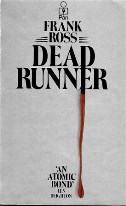 There is also a wry
piece of advice given to the Home Secretary who enquires as to whether the
atomic device has actually been constructed or stolen from an official
facility: For years people have been speculating on how it could be done. Hijack,
straightforward purchase, it’s kept a whole battalion of novelists in business.
But that’s what it is. Pure fiction. Nuclear security has been made practically
watertight since the end of the Sixties. That was written in 1977. I think
few of the current battalion of thriller writers would share Frank Ross’
optimism. There is also a wry
piece of advice given to the Home Secretary who enquires as to whether the
atomic device has actually been constructed or stolen from an official
facility: For years people have been speculating on how it could be done. Hijack,
straightforward purchase, it’s kept a whole battalion of novelists in business.
But that’s what it is. Pure fiction. Nuclear security has been made practically
watertight since the end of the Sixties. That was written in 1977. I think
few of the current battalion of thriller writers would share Frank Ross’
optimism.
When first published,
Len Deighton called it ‘An atomic Bond’ and Alistair MacLean labelled it ‘A
masterpiece in sustained pyrotechnics’. Both were spot on and it’s a mystery to
me how I managed to miss this book and this author. But then, the real mystery
may be who is, or was, the author. Who exactly was ‘Frank Ross’?
The biographical
blurb supplied in the Pan paperback edition I now proudly own, says that the
author is ‘dedicated to the pursuit of contented anonymity’ and gives few real
details. There is a theory that Frank Ross was the pen-name of, at least
initially, a pair of co-operating writers: Colin Northway (about whom I know
nothing) and Michael Ewing. I have found a reference to a Michael Ewing
(1934-2009) who was for a time a journalist in Norfolk – and the section of Dead
Runner which is set on the East Anglian coast in winter rings very true
– who also wrote one of the ‘Frank Ross’ thrillers solo (there were, I think,
six titles) and at least one adventure thriller under the name Blair Stuart.
Whoever he/they was
or were ‘Frank Ross’, my discovery has been a pleasure and a successful opening
shot for the Bangers initiative. I will keep an eye out for other Frank Ross
titles and have already snapped up Sleeping Dogs, a Cold War thriller
about a KGB sleeper cell, planted in Boston in 1958, is activated twenty years
later.
In Cold Blood?
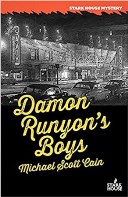 Real historical and
literary figures have both been used to good effect as detectives in crime
fiction, from Peter Lovesey’s ‘Bertie’ Prince of Wales to Nicola Upson’s
Josephine Tey, for example. A new detective pairing in a novel from Stark House
Press in America, provides two, if not three, such protagonists. Real historical and
literary figures have both been used to good effect as detectives in crime
fiction, from Peter Lovesey’s ‘Bertie’ Prince of Wales to Nicola Upson’s
Josephine Tey, for example. A new detective pairing in a novel from Stark House
Press in America, provides two, if not three, such protagonists.
Damon Runyon’s Boys by Michael Scott Cain is a period
mystery set in late 1940s New York, which not only invokes Runyon but pairs, as
would-be detectives, the legendary American broadcaster Walter Winchell and the
undefinable Truman Capote.
How would Truman
Capote have felt about being reincarnated as a fictional detective? I think he
would have loved it.
Bloggers
Before their Time
I mentioned last time the exhibition honouring thriller
writer Desmond Bagley being organised as part of the Guernsey Literary Festival
and the driving force behind it, Phil Eastwood who runs the ‘Bagley Brief’
website. Now Phil tells me that a
feature written by Desmond Bagley for the British Tourist Authority magazine In Britain in 1980, in praise of his
adopted island home has been revived and is reprinted on the official ‘Visit
Guernsey’ website at https://www.visitguernsey.com/blog/little-peace-britain.
The author is credited as the website’s ‘Guest Blogger’ and
I suspect Bagley would have been amused at the thought of becoming a ‘blogger’ for
the first time, thirty-five years after his death.
French
Leave
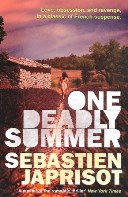 The late Sebastien Japrisot (1931-2003) was a scriptwriter,
novelist and film director who was often called ‘the French Graham Greene’. He
was responsible for one of my favourite titles (no, not The Story of O, though he did write the script for the 1975 film),
his crime novel The Lady in the Car with Glasses and the Gun. The late Sebastien Japrisot (1931-2003) was a scriptwriter,
novelist and film director who was often called ‘the French Graham Greene’. He
was responsible for one of my favourite titles (no, not The Story of O, though he did write the script for the 1975 film),
his crime novel The Lady in the Car with Glasses and the Gun.
I was not, until now, familiar with his novel of suspense
and revenge set in Provence, One Deadly Summer, which was first published
in English in 1980 but is now brought to us in a fresh translation by Gallic
Books.
My advisor on all things French, if you’ll pardon the
double-entendre, tells me that she found that this intense tale of lust and
betrayal has not dated in the slightest. That is something, sadly, she rarely
says about me.
*
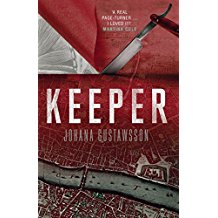 Once again for legal reasons, I have not seen that other
notable crime novel translated from the French - Keeper, published by
Orenda Books. Indeed, sad to say, I have never seen anything published by
Orenda. Once again for legal reasons, I have not seen that other
notable crime novel translated from the French - Keeper, published by
Orenda Books. Indeed, sad to say, I have never seen anything published by
Orenda.
Which is a pity, as Keeper sounds very interesting, offering
a split narrative between modern crimes and Jack the Ripper’s Whitechapel. The
author, Johana Gustawsson is a French journalist married to a Swede, living in
London and I discover that the book was translated (as I believe was Johana’s
first novel Block 46) by my old co-editing chum Maxim Jakubowski.
Those
Golden Age Dames
The accepted wisdom is that the ‘Golden Age’ of the English
detective novel (the 1920s and 30s) was dominated by four ‘Queens of Crime’:
Agatha Christie, Dorothy L. Sayers, Margery Allingham and Ngaio Marsh.
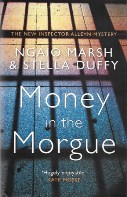 Of those ‘Big Four’ I confess it is Ngaio Marsh whose
backlist I have least visited, though when I have I have been greatly impressed
with the way she described actors and theatrical folk, in all their pomposity
and insecurity. This should not be surprising as Dame Ngaio’s real passion was
the theatre and almost single-handed she revived interest in live theatre in
her native New Zealand. Of those ‘Big Four’ I confess it is Ngaio Marsh whose
backlist I have least visited, though when I have I have been greatly impressed
with the way she described actors and theatrical folk, in all their pomposity
and insecurity. This should not be surprising as Dame Ngaio’s real passion was
the theatre and almost single-handed she revived interest in live theatre in
her native New Zealand.
During WWII, Dame Ngaio had her detective hero Roderick
Alleyn solving murders and countering espionage in New Zealand and some time (I
am guessing here) after she had completed Colour Scheme in 1943, she began a
new novel but abandoned it after three chapters. Using those chapters and Dame
Ngaio’s notes, the novel Money in the Morgue (Collins Crime
Club) has now been completed by Stella Duffy, and a more appropriate
‘completist’ author could hardly have been wished for.
Stella Duffy is not only an accomplished crime writer and an
experienced theatrical producer, actor and playwright (she was awarded the
O.B.E. for services to the arts), but also spent her childhood in New Zealand.
Thus she is eminently qualified, not only to take on Ngaio Marsh’s mantle, but
to help us non-Maori speakers with the pronunciation of place names and to
remind us that the ‘g’ in Ngaio is silent. (I must tell Stella, that in West
Yorkshire when I and other callow youths were swapping paperback detective
stories, it wasn’t; but then we simply didn’t know any better.)
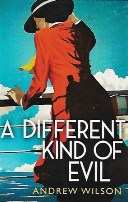 After a turbulent year (1926) to say the least, when she was
something of a gone girl, that most promising of crime writers Agatha Christie
sets sail on a liner bound for the Canary Islands. This is not R & R though;
there is a mission for the British Secret Service involved, but even before she
reaches Tenerife, Agatha witnesses a woman (a mentally unstable heiress,
naturally) throw herself overboard. After a turbulent year (1926) to say the least, when she was
something of a gone girl, that most promising of crime writers Agatha Christie
sets sail on a liner bound for the Canary Islands. This is not R & R though;
there is a mission for the British Secret Service involved, but even before she
reaches Tenerife, Agatha witnesses a woman (a mentally unstable heiress,
naturally) throw herself overboard.
Can Agatha use her writing talent and plotting skills to
solve the mystery? Almost certainly, and to find out how, consult A
Different Kind of Evil by Andrew Wilson, published at the end of the
month by Simon & Schuster. It is the second ‘case’ for Agatha as detective
by Andrew Wilson, who is, coincidentally, a biographer of Patricia Highsmith.
Now the talented Miss Highsmith, there’s a crime writer I’d
like to see as a fictional detective to lead us down those unlit mean streets.
Bookmarks
I Have Known
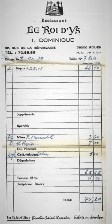 I have always regarded myself as something of a conservative
when it comes to bookmarks, preferring to use proper bookmarks as produced by
publishers and bookstores. One day I am sure my collection will be much argued
over by social historians, but I am aware that other readers tend to use what
first comes to hand. Often, they leave these intriguing mementos for others,
such as myself, when the book they were reading passes into the second-hand
market and they can tell a story as well as the one in the book they marked. I have always regarded myself as something of a conservative
when it comes to bookmarks, preferring to use proper bookmarks as produced by
publishers and bookstores. One day I am sure my collection will be much argued
over by social historians, but I am aware that other readers tend to use what
first comes to hand. Often, they leave these intriguing mementos for others,
such as myself, when the book they were reading passes into the second-hand
market and they can tell a story as well as the one in the book they marked.
One recent find was a restaurant receipt from October 1978
for a no-doubt very pleasant lunch at Le
Roi d’Ys in Rouen. I am sure there must be an interesting story behind that
rather abstemious lunch (twice as much spent on Perrier as on wine) but one
would have to imagine it as the restaurant, sad to say, is now a Japanese
sushi bar. The bill, for 75 francs 20 centimes would at the time have been in
the region of £8.80 in British currency.
 
A more recent find, in an American paperback, was a pristine
Bulgarian 100 Lev banknote. Bulgaria, I am told, is not yet a member of the
Eurozone and the note could therefore be worth £44.95 in sterling, or an
estimated £4.95 after Brexit.
|
|
Books
of the Month
I have been a fan of Philip Kerr’s Bernie Gunther thrillers
for almost thirty years and over the years have become incredibly jealous of a
series where the books get longer, more expansive and more addictive. The
quality of Philip’s latest is as high as ever.

Greeks
Bearing Gifts, out
this month from Quercus, sees Bernie – having made it alive to 1957 under yet
another assumed identity – working among the dead as a mortuary attendant in
Munich. Quiet and steady work, you’d think, but you’d be wrong. Bernie is soon
recognised by a former fellow policeman from pre-Hitler days now attempting to
scam the East German intelligence service.
Reluctantly Bernie gets involved and after a nifty bit of
treble-crossing finds himself a seemingly safer job as an insurance assessor.
But Bernie’s safety is the one thing not insured when he is sent to Athens on
an investigation which takes him back into the dark memory of the war years.
As usual, Kerr’s research is immaculate and effortlessly
presented. (I did not know, for instance, that Nazi concentration camps had
insurance cover against fire, theft and ‘other risks’ but if Bernie Gunter
tells me it was so, then I am willing to believe it.) The writing is as fluent
as ever, with Bernie’s voice coming over in classic hard-boiled, cynical tones.
A shady policeman’s cigar smells like a
bonfire in a plague pit and at one point, he ruminates that It probably took a German to invent the idea
of an archduke.
Greeks
Bearing Gifts is a
totally satisfying cocktail of plot, character and modern European history,
raising more than a few moral conundrums seasoned with some dry (and prophetic)
comments about the European Economic Community and the economic efficiency of
Greece
*
As a long-term fan of Marcus Didius Falco, Lindsey Davis’
Roman private eye, I admit to coming around to the exploits of his daughter and
fictional successor Flavia Alba rather slowly. However, if I ever had any
doubts, Pandora’s Boy published by Hodder, dispels them.

With a missing husband – a husband struck by lightning
during their wedding (not a good start) – and short of funds, Flavia takes on a
case on behalf of missing hubby’s first wife. The case involves a dead teenage
girl, possibly poisoned by a love potion, and smacks of witchcraft. It also
takes Flavia out of her normal hunting ground on the Aventine to the posher,
more respectable Quirinal Hill district of Rome in the year 89 AD, which saw
Domitian firmly and ruthlessly entrenched as Emperor.

For those unfamiliar with the districts of Imperial Rome, I
have attempted a crude sketch map to show the Aventine and the Quirinal. Today
the Quirinal Palace is the home of the Italian President and seen by thousands
of tourists each year trying to find the Trevi Fountain.
Back in Flavia Alba’s day the Quirinal had fewer tourists
but held many dangers for an independent female private investigator, however
streetwise, however resourceful. And many of the dangers and prejudices she
faces are still there after two thousand years.
Pandora’s
Boy sees Lindsey Davis on
top form and her prose has the same sparkle and fizz as when she first introduced
us to Falco (now going straight as an auctioneer) way back in 1989, which is a
career longer than that of most Roman Emperors.
*
English crime writers setting their fiction abroad with
foreign detectives is by no means a recent phenomenon. Roderic Jeffries
launched his Inspector Alvarez series (Mallorca) in 1974; David Serafin’s
Superintendent Bernal (Spain) and James Melville’s Superintendent Otani (Japan)
both debuted in 1979; and Michael Dibdin’s Aurelio Zen (Italy) arrived in 1988.
Part of the appeal of such books is the examination of distinctly foreign
locations, culture and attitudes through familiar, though hopefully not
rose-tinted, lenses.
I freely admit that what first drew me to Peter Morfoot’s
Captain Darac mysteries set in Nice, was the prospect of a goodly portion of
southern French lifestyle (sun, wine, warm croissants – what’s not to like?)
and the added bonus of a feast of jazz and blues lore as hero Darac, when off
duty, plays guitar in the Didier Musso Quintet, a quintet which has been known
to contain seven or even twelve musicians.
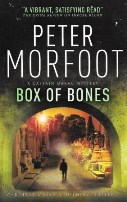
With Box of Bones, from Titan Books, though,
Peter Morfoot has gone way beyond playing the fictional tourist card and has
produced an accomplished piece of crime fiction, a policier (if you’ll pardon my French) with an ensemble cast which
brings back fond memories of Reginald Hill’s Dalziel and Pascoe tales of
‘Mid-Yorkshire’ and John Harvey’s Nottingham of Inspector Resnick. The wine is
better and cheaper in Morfoot’s Nice, but now the multi-layered plots, the
credible crimes (although there’s a very
clever robbery in this one) and the all-too-human characters are getting just
as good.
The book should come with a warning to fans of guitar-based
blues, as a Gibson guitar is sorely mis-used in this novel. The late and much lamented B.B. King is
probably turning in his grave, but despite that Paul Darac is a hero, and this
is a series, well worth investing in.
*
Sending Christopher Fowler’s detective duo, that perfect odd
couple, Bryant and May back to the future as it were, to solve a country house
murder in 1969 doesn’t sound remotely exceptional given some of the previous
antics of these denizens of the Peculiar Crimes Unit.
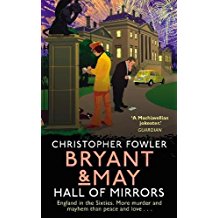
To be honest, a county house murder with a closed circle of
suspects as in their latest adventure, Bryant & May: Hall of Mirrors,
from Doubleday, belongs in the realm of the Perfectly Ordinary Crimes Unit in
comparison with some of their cases, even if a body has been fed into a
compost/sewage macerator…
Set to a late Sixties soundtrack, with some wonderful gags
about the Swinging Sixties and not a few very astute sideswipes about present
day London, this is Christopher Fowler enjoying himself and just when you think
his dynamic duo of ancient detectives are completely out of their depth at a
week-end country house party in Kent, well then, you’d be right. Fortunately
for them (and us) one of the guests at the house party is ‘Pamela Claxon’ who
is (you could have guessed) a crime writer, the author of the ‘Inspector
Trench’ mysteries. In Chapter 25 she reveals some of the techniques of writing
a traditional mystery novel – and her forthright opinions of Hercule Poirot and
Miss Marple – including the famous ‘Chekhov’s gun’ ploy. No wonder Arthur
Bryant is lost in admiration.
*
R.N.(Roger) Morris
made his name with a quartet of fabulous crime novels featuring Dostoyevsky’s
19th century Russian detective Porfiry Petrovich. Recently he has
switched police forces and historical period and given us Detective Inspector
Silas Quinn of the Special Crimes Department of the Metropolitan Police on the
eve of World War I.
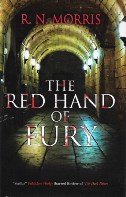
In his fourth outing, The Red Hand of Fury, out now from
Severn House, Roger puts his policeman hero through hell in a case where the
inmates really do seem to have taken over the asylum. The lunatic asylum in
question is the famous, or infamous, Colney Hatch (now Princess Park Manor just
inside the M25) which seems to be the source of an epidemic of similar suicides
where the victim strips naked before doing the deed, in one case by jumping in
to the polar bear enclosure at London Zoo.
As always, Roger Morris shows how adept he is at filling in
the fascinating detail of the period he is writing about; particularly, in this
case, on the attitudes to insanity and the practice of psychiatry in 1914, when
old values were about to be challenged if not destroyed. There is also a
character who is a writer with an interest in aviation and space travel, the
author of the novel The Blood Planet. Now
I wonder who could have inspired that?
*
For legal reasons I have not had time (yet) to read Andrew Taylor’s
The
Fire Court (HarperCollins), the follow-up to his enthralling bestseller
Ashes
of London.
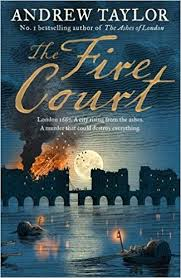
I will make sure I do read it this month, partly because I
was enthralled by its predecessor (much of which I read in one of the first
public houses to be rebuilt after the Great Fire – spoiler alert? – of 1666),
and partly because I am appearing with Andrew Taylor at an event at CrimeFest in May (and by ‘event’ I mean
testosterone-fuelled slanging match) – and I like to be forewarned and well-armed.
Pip! Pip!
The Ripster
|